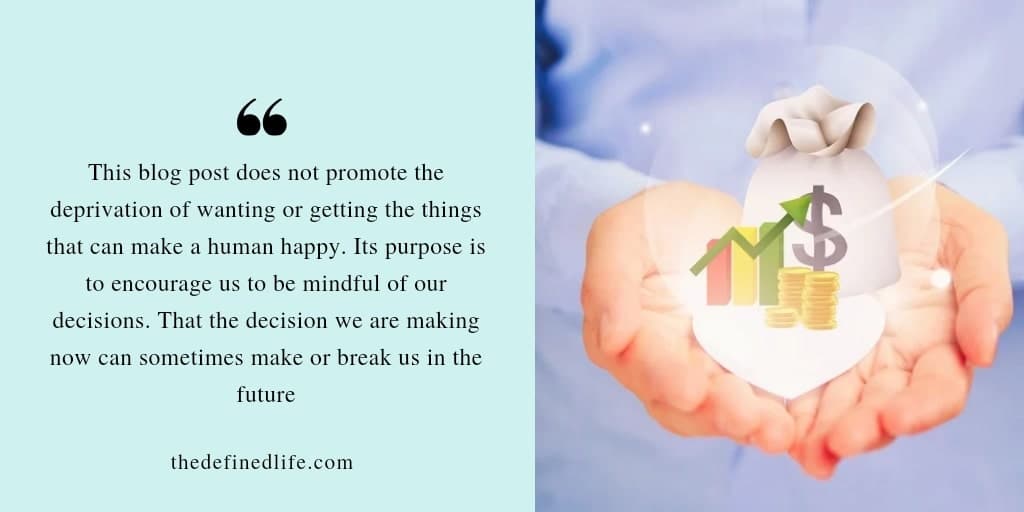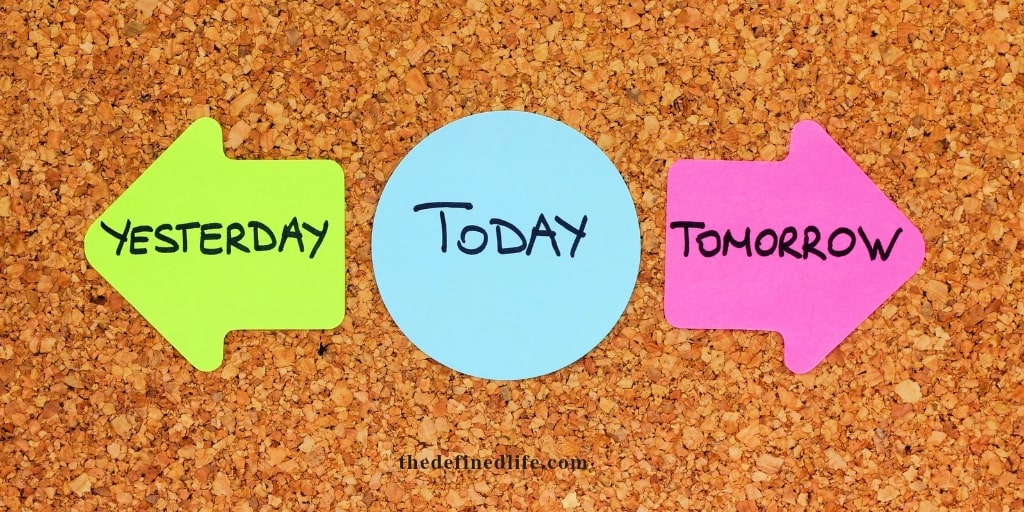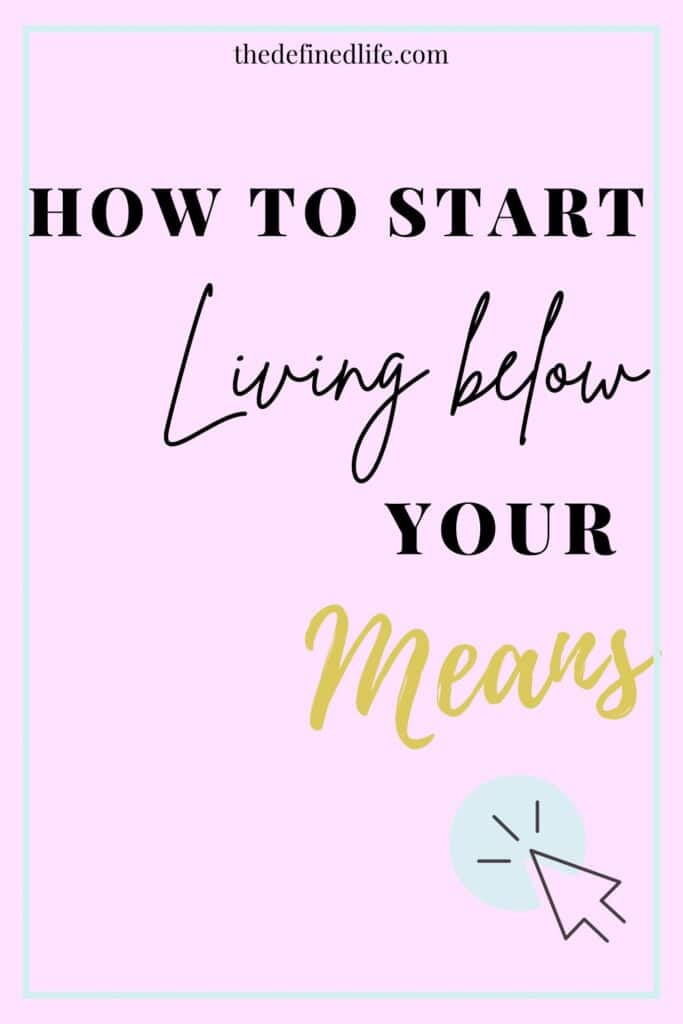
The topic of living below your means can be controversial. Others think that this promotes a scarcity mindset. But to put it simply, it only means that you are spending less than what you earn.
For me, living below your means does not limit you to live and enjoy life. Instead, it only involves a person’s ability to be mindful of their spending habit. This blog post will be about the benefits, challenges, and how you can practice living below your means- not a means to restrict you, but instead help you attain financial peace and freedom.
Table of Contents
The Benefits of Living below your means
- It will make you financially stable in the long run– although achieving financial stability results from many wise decisions. It can start with watching your spending attitude closely. When you live within your means, you will have extra money to pay off outstanding debts, build an emergency fund or increase your savings.
- It will help you achieve other long-term goals– Without worrying about living paycheck to paycheck, you will have excess money to pursue other long-term goals. This may include buying a house, pursuing learning or education, or venturing into your passion projects and businesses.
For instance, you can start saving up a fund to make a big downpayment for a house. This will result in lower mortgage payments and reduce your long-term debt.
You can focus more on improving your knowledge and pursuing your study. You can use your extra savings to invest in courses and hone your skills, opening bigger earning opportunities.
You will also have a chance to venture into businesses or pursue your passion projects, knowing that living below your means allows you to cover your living expenses.

- It will help you avoid financial stress– not having to worry about money to spend for your basic needs and knowing you have a savings or emergency fund to assist you in times of need is a big thing.
Imagine how stressful it will be when you opt to secure loans or credit card debts because you want to have expensive material things that you cannot afford. That’s why being realistic and mindful of your spending will help you avoid unnecessary financial stress.
- It will help you attain financial independence– Who would not love to sustain his living without working? That is financial independence. It is not impossible if you know how to handle your money. Living below your means can pave the way for you to live a financially independent life. Having a surplus of money allows you to explore building a passive source of income. A passive source of income, like owning a property you can rent out-, is one way a person can attain a financially independent life. How can you invest in building your passive income if you have credit card debt or loans that you need to take care of and are barely trying to keep your head at all time? That is indeed challenging.
- It can help you pay your debt fast- Living below your means gives you money to pay off your existing obligation fast. You can set aside your money to accelerate your minimum debt payment and reduce the burden of dealing with high-interest payments.
Signs that you are living beyond your means
Are you unsure what not living below your means looks like? Let’s see the sign of a person living beyond their means.
- They rely on credit cards or loans to cover their basic needs or sustain their lifestyle.
- They have small or no savings at all.
- They have difficulty paying their bills on time
- They cannot make progress with their financial goals.
- They are experiencing constant worry about money.

Tips on how to start living below your means
Do you identify all or some signs of the person not living within their means? It is now time to share some tips to help you transition from living beyond to living within.
- Identifying and understanding the root cause- As an auditor, I must include the root cause analysis in all my audit reports. I realize that in every area of life- identifying the root cause can help us understand why a problem exists. Same with our financial life, if you are living beyond your means- you must first identify why you act that way. Only you can accurately determine why you spend more than what you earn.
Examples of the reasons can be a lack of financial knowledge, you do not have or believe in budgeting, or spending might be a coping mechanism. Identifying and understanding the root cause is the first step to cure the problem.
- Create and stay within your budget: Having a budget is essential to understand your current financial status. Having a budget is important to start living below your means.
A budget will give you the figures that will guide you on how and where to spend your income. Giving you a reality check about your current financial status will help you decide your subsequent courses of action.
The things you need to do start with knowing where you are now. However, a budget should not only be left on a piece of paper or a spreadsheet- it will defeat its purpose if you do not stay within your budget. For this to work, you should have a budget and adhere to it consistently.
- Live in the present but also think about the future- I indeed embrace living in the present- it is not wrong to enjoy life as it is. But what’s alarming is putting yourself in a tight position to justify that you are just living in the moment.

Continuously collecting debts to keep up with the things your income can’t afford is risky. Sure, it is not wrong to enjoy things now, but we should also remember that we must prepare for the future.
It is especially true for parents like me; even if we can buy some things we want, we must consider that we have kids relying on us. Being a parent means we must provide and give them a good life. And for everyone, we can quickly be struck by unexpected events that can financially strain us. That is why we must balance both- living a good life and not giving ourselves a problem in the future as well.
- Do not be pressured- We are more vulnerable to pressure at this age. We have advertisements bombarding us with pretty, expensive things.
We are exposed to social media, where people constantly convince us to buy their products or live up to their lifestyles. Social media or even your circle can influence your spending habits. Sometimes, overspending happens because we want to keep up with our circle or show the world we are doing well.
- Prioritize savings and investment- I make sure that I set aside for my savings and investment. This decision helps me to live below my means.
Yes, you may have a budget, but it will not be helpful if you do not decide to focus on activities that will help you feel secure- savings and investment. Making savings and investments your priority will convince you to avoid your big unnecessary spending.
- Find another source of happiness- We experience instant satisfaction when we get what we want. Online shopping allows us to overspend when we are bored, stressed, or want to be happy.
The thing about doing this is that we do not realize that spending and having the material things we want becomes our only source of happiness. Expecting to be happy when we get the things we want could lead to overspending.
And so, it begins manifesting in our life, and we live beyond our means. There are other ways to be happy, and most of them are free and not tied to the possession of material things.
Try to ask yourself if you are overspending because of specific emotions and apply ways to deal with it more healthily.
- Find ways to increase your income- Some people do not intentionally want to overspend.
Other places have standard living costs, and sometimes that is why a person ends up living beyond his/her means. If relocating is not an option, increasing your income is the only way to cope.
Final thoughts on living below your means

Living below your means is a powerful mindset and actions you can do now that can have a lasting benefit for our financial health. Without constant worry about financial matters, a person can perform well in life, be a positive source of positivity, and be more capable of pursuing other essential goals.
This blog post does not promote the deprivation of wanting or getting the things that can make a human happy. Its purpose is to encourage us to be mindful of our decisions. That the decision we are making now can sometimes make or break us in the future.
Love,








Leave a Reply